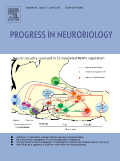
Molecular Brain
Scope & Guideline
Unraveling the Mysteries of Neural Function at the Molecular Level
Introduction
Aims and Scopes
- Neurobiology and Molecular Mechanisms:
Research focused on the molecular and cellular mechanisms underlying brain function, including synaptic transmission, neurogenesis, and cellular signaling pathways. - Neurodegenerative Diseases:
Studies that investigate the pathophysiology of neurodegenerative diseases such as Alzheimer's, Parkinson's, and amyotrophic lateral sclerosis (ALS), exploring genetic, biochemical, and environmental factors. - Neuroinflammation and Immune Responses:
Exploration of the role of neuroinflammation and the immune system in brain health and disease, including the impact of inflammatory mediators on neuronal function. - Neurodevelopment and Plasticity:
Research on the development of the nervous system, including neuronal differentiation, synaptogenesis, and the plasticity of neural circuits in response to experience. - Behavioral Neuroscience:
Studies examining the relationship between molecular mechanisms and behavior, including the effects of genetic and pharmacological manipulations on cognitive and emotional processes.
Trending and Emerging
- Circadian Rhythms and Brain Function:
Research exploring the influence of circadian rhythms on brain physiology and pathology is on the rise, highlighting the importance of temporal dynamics in neural processes. - Microbiome and Brain Health:
Studies investigating the gut-brain axis and the impact of the microbiome on neurological health and disease are emerging, emphasizing the interconnectedness of systemic and neural health. - Gene Therapy and Neuroregeneration:
The exploration of gene therapy techniques for neurodegenerative diseases and brain injuries is gaining momentum, reflecting advancements in molecular biology and genetic engineering. - Neurotechnologies and Optogenetics:
Innovative uses of optogenetics and other neurotechnologies are increasingly featured, allowing for precise manipulation of neuronal activity and enhancing our understanding of neural circuits. - Role of Non-Coding RNAs in Neurobiology:
There is a growing focus on the role of non-coding RNAs, such as microRNAs and long non-coding RNAs, in regulating gene expression in the context of neurodevelopment and neurodegeneration.
Declining or Waning
- Traditional Pharmacological Approaches:
Research focusing solely on classical pharmacological interventions without integrating molecular or genetic insights has decreased, as the field shifts towards more mechanism-based approaches. - In Vitro Studies with Limited Clinical Relevance:
There has been a noticeable reduction in the publication of in vitro studies that do not translate well to in vivo models or clinical scenarios, reflecting a trend towards more applicable research. - Studies on Basic Pain Mechanisms:
While pain research remains significant, there has been a waning interest in basic mechanisms of pain without the context of neuroinflammation or neurodegenerative implications, signaling a shift to more integrated studies. - Animal Models without Genetic Manipulation:
The use of traditional animal models without genetic modifications has seen a decline, as the journal increasingly favors studies that utilize genetically modified organisms to elucidate disease mechanisms.
Similar Journals

ACTA NEUROBIOLOGIAE EXPERIMENTALIS
Fostering Knowledge in Neurobiological PhenomenaACTA NEUROBIOLOGIAE EXPERIMENTALIS, an esteemed journal published by the Nencki Institute of Experimental Biology in Poland, has been a pivotal platform for the dissemination of research in the fields of medicine and neuroscience since its inception in 1970. With an ISSN of 0065-1400 and an E-ISSN of 1689-0035, this journal has consistently aimed to contribute to the understanding of neurobiological phenomena, cementing its status within the academic community. Despite its current categorization in the Q3 and Q4 quartiles for Medicine and Neuroscience respectively, ACTA NEUROBIOLOGIAE EXPERIMENTALIS continues to uphold rigorous scientific standards, providing an invaluable resource for researchers, professionals, and students alike. As an essential scholarly outlet, it encourages the exploration of groundbreaking findings and clinical applications in neurobiology, making it an attractive choice for those eager to advance their understanding of this intricate field.

ASN Neuro
Fostering Discoveries in the Complex World of Brain FunctionASN Neuro is an esteemed academic journal published by Frontiers Media SA, focusing on critical advancements in the fields of neurology and neuroscience. Since its inception in 2009, it has established itself as an Open Access platform dedicated to fostering the dissemination of knowledge and research findings that address the complexities of the nervous system. With an impressive impact factor and consistently ranking in the top quartiles of its categories—Q1 in Neurology (clinical) and Q2 in Neuroscience (miscellaneous)—ASN Neuro is recognized for its high-quality publications that cater to the evolving challenges in clinical neurology and general neuroscience. Currently, it ranks 68th out of 400 journals in Clinical Neurology and 28th out of 113 in General Neuroscience, affirming its reputable position within the academic community. Researchers, professionals, and students alike are encouraged to contribute to and benefit from this impactful journal as it presents a unique opportunity to engage with cutting-edge research, innovative methodologies, and insightful reviews in the ever-evolving landscape of brain science.

METABOLIC BRAIN DISEASE
Connecting disciplines to combat brain disease.METABOLIC BRAIN DISEASE, published by SPRINGER/PLENUM PUBLISHERS, is a leading journal dedicated to advancing our understanding of the metabolic processes impacting brain health and disease. Established in 1986 and set to continue until 2024, this journal encompasses a wide range of interdisciplinary research that intersects the fields of Biochemistry, Cellular and Molecular Neuroscience, and Neurology, as evidenced by its notable quartile placements in Q2 and Q3 for 2023. With an ISSN of 0885-7490 and an E-ISSN of 1573-7365, it serves as a vital resource for researchers and practitioners aiming to deepen their insights into cerebral metabolic disorders and their implications. Although currently not an Open Access option, its rigorous peer-review process ensures that high-quality, impactful research reaches its audience. Showcasing a significant rank within the top percentile of its categories, METABOLIC BRAIN DISEASE is instrumental in shaping the future of neurological research and clinical applications.

PROGRESS IN NEUROBIOLOGY
Exploring the Depths of Brain FunctionPROGRESS IN NEUROBIOLOGY is a prestigious journal dedicated to advancing the field of neuroscience, published by Pergamon-Elsevier Science Ltd. With an impressive impact factor, it stands as a critical resource for researchers, professionals, and students alike, featuring rigorous peer-reviewed articles that explore the latest developments in neurobiology. The journal has established itself as a leading publication, ranked in the Q1 category for Neuroscience (miscellaneous) and holding a notable 13/113 rank in General Neuroscience per Scopus metrics, placing it in the top 12% of its field. Since its inception in 1959, PROGRESS IN NEUROBIOLOGY has covered a wide array of topics, from molecular mechanisms to cognitive processes, fostering a comprehensive understanding of brain functions. While the journal is not open access, it ensures accessibility to profound knowledge through institutional subscriptions. Researchers and scholars will find critical analyses and innovative research that are pivotal for both foundational knowledge and cutting-edge investigations in the neuroscience realm.

Frontiers in Molecular Neuroscience
Bridging gaps in knowledge to combat neurological challenges.Frontiers in Molecular Neuroscience, published by FRONTIERS MEDIA SA, is an esteemed open-access journal dedicated to advancing our understanding of the molecular mechanisms underlying neurological functions and disorders. Since its inception in 2008, the journal has established itself as a reputable source of cutting-edge research, earning a respectable Q2 ranking in both the fields of Cellular and Molecular Neuroscience and Molecular Biology as of 2023. With an ongoing commitment to fostering innovation, the journal presents a platform for researchers, professionals, and students to disseminate their findings and engage in scholarly discourse. The E-ISSN 1662-5099 ensures that research is readily accessible, facilitating the exchange of knowledge crucial to tackling the complexities of neurological conditions. Situated in Switzerland, the journal’s global reach is augmented by its open-access model, allowing for wide dissemination of critical research findings to a diverse audience. Join the vibrant community of scientists and practitioners who are shaping the future of molecular neuroscience through their contributions to this dynamic journal.

BRAIN RESEARCH BULLETIN
Unveiling the mysteries of the brain, one study at a time.BRAIN RESEARCH BULLETIN is a leading academic journal published by PERGAMON-ELSEVIER SCIENCE LTD, dedicated to the dissemination of high-quality research in the interdisciplinary field of neuroscience. Since its inception in 1976, this journal has served as a vital platform for researchers, professionals, and students interested in a broad spectrum of topics within neuroscience, making significant contributions to the understanding of brain function and its associated disorders. With a commendable impact factor and a current Scopus rank of #35 out of 113 in general neuroscience, the journal holds a Q2 quartile ranking, underscoring its relevance and influence in the academic community. BRAIN RESEARCH BULLETIN invites submissions of original articles, reviews, and brief communications, enhancing scholarly communication within this dynamic field. Although the journal is not open access, it ensures widespread reach and impact through various subscription models, allowing access to pivotal findings that pave the way for future research advancements. For researchers aiming to share impactful discoveries and insights within the neuroscience community, BRAIN RESEARCH BULLETIN remains an essential outlet.

Annual Review of Neuroscience
Elevating Understanding Through Authoritative ReviewsThe Annual Review of Neuroscience, published by Annual Reviews, is a premier journal that has been at the forefront of neuroscience research since its inception in 1978. With an ISSN of 0147-006X and E-ISSN 1545-4126, this leading academic journal boasts a remarkable impact factor, placing it in the prestigious Q1 category in Neuroscience (miscellaneous), with an impressive Scopus ranking of 4 out of 113 and a stellar 96th percentile in general neuroscience. Focused on publishing comprehensive and authoritative review articles, the Annual Review of Neuroscience aims to synthesize and critically evaluate the latest advances in the field, making it an indispensable resource for researchers, professionals, and students alike. While it does not offer open access, the insights and discoveries highlighted in its issues are crucial for those dedicated to understanding the complexities of the nervous system and driving forward innovative research. With a commitment to excellence and a forward-looking perspective, this journal continues to shape and influence the future of neuroscience.

CEREBRAL CORTEX
Exploring the intricacies of the brain.CEREBRAL CORTEX, published by Oxford University Press Inc, is a premier journal dedicated to advancing the field of neuroscience, specifically focusing on the cellular, molecular, and cognitive aspects of cortical structure and function. With an impressive impact factor that situates it in the top quartile (Q1) of its categories for 2023, this journal holds significant relevance for researchers and professionals interested in the latest discoveries and methodologies in both Cognitive Neuroscience (ranked #31 out of 115) and Cellular and Molecular Neuroscience (ranked #48 out of 97). Operating without an open access model, it ensures rigorous peer review and dissemination of high-quality research from across the globe. Since its inception in 1991, CEREBRAL CORTEX has established itself as a critical platform for educators and inventors, pushing the boundaries of knowledge in understanding brain function and its implications for behavior. Researchers and students alike will find this journal an invaluable resource for both foundational and cutting-edge studies in neuroscience.

eNeuro
Connecting minds to advance the science of the nervous system.eNeuro is a prominent open-access journal published by the Society for Neuroscience, dedicated to advancing the field of neuroscience through the dissemination of high-quality research. Launched in 2015, it reflects its commitment to accessibility by providing a platform for innovative studies and advancements in neurobiology. The journal holds a strong reputation, achieving a Q1 ranking in Medicine (miscellaneous) and a Q2 in Neuroscience (miscellaneous) as of 2023, with Scopus rankings placing it at #56 out of 113 in General Neuroscience, marking it in the 50th percentile. With its convergence to cover articles from 2014 to 2024, eNeuro continues to serve as a vital resource for researchers, professionals, and students alike, offering a comprehensive hub for the latest discoveries and theoretical developments in neuroscience. As part of its mission, eNeuro aims to foster collaboration and inspire the academic community with openly accessible content, making significant contributions to scientific discourse.

EXPERIMENTAL NEUROLOGY
Fostering Excellence in Neurobiological Inquiry.EXPERIMENTAL NEUROLOGY is a premier academic journal published by Academic Press Inc, Elsevier Science, focusing on advancements in the fields of Developmental Neuroscience and Neurology. With an impressive Impact Factor and ranked in the Q1 quartile of both categories—positioning it among the top-tier journals—this publication has established itself as a vital resource for researchers, clinicians, and students alike. Since its inception in 1959, it has fostered the dissemination of cutting-edge research and innovative approaches to understanding neurological function and related disorders. While EXPERIMENTAL NEUROLOGY currently operates under a subscription access model, its rich archives and ongoing contributions to the field continue to inspire and inform the next generation of neurobiologists. The journal also boasts a high ranking in Scopus, placing fourth in Developmental Neuroscience and twentieth in Neurology, indicating its robust influence and scholarly significance. For those committed to advancing knowledge in these critical areas, EXPERIMENTAL NEUROLOGY is an indispensable platform for inquiry and discovery.